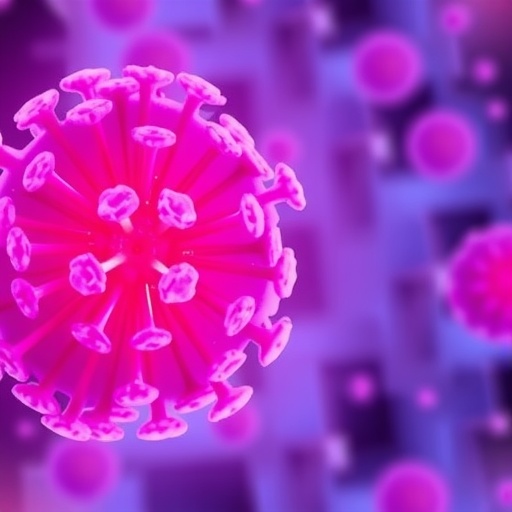In a groundbreaking study that could redefine therapeutic strategies for breast cancer, researchers have unveiled the potent role of genistein, a naturally occurring isoflavone, in amplifying Toll-like receptor 3 (TLR3)-mediated apoptosis and immune signaling within breast cancer cells. This revelation is poised to ignite fresh avenues in oncologic treatment paradigms, particularly for a malignancy that continues to demonstrate complex resistance to conventional therapies. The molecular intricacies unraveled in this research underscore the convergence of immune modulation and apoptosis induction as a dual-threat against tumor proliferation.
Breast cancer, characterized by heterogeneous molecular subtypes and variable prognoses, necessitates targeted interventions that can synergize with the body’s innate immune mechanisms. TLR3, a member of the pattern recognition receptor family, acts as a sentinel within the cellular milieu by detecting double-stranded RNA (dsRNA) typically associated with viral pathogens. Activation of TLR3 triggers downstream signaling cascades employing adaptor molecules such as TRIF, culminating in the induction of type I interferons and other pro-apoptotic factors. However, this pathway’s therapeutic exploitation has been marred by cellular resistance and suboptimal activation in malignant contexts.
Genistein, predominantly found in soy products, has long been cataloged for its tyrosine kinase inhibitory activity and phytoestrogenic properties. Its potential in cancer biology has attracted significant attention, yet the mechanistic underpinnings of its interaction with innate immune receptors like TLR3 had remained elusive until recently. The current study elucidates that genistein augments TLR3 signaling, thereby intensifying apoptotic processes and immune activation within breast cancer cells, establishing a novel biochemical synergy.
Methodologically, the investigation employed both in vitro cultures of breast cancer cell lines and molecular assays to probe the effects of genistein on TLR3 activation status. Upon treatment with genistein, cells exposed to synthetic TLR3 agonists—such as polyinosinic:polycytidylic acid (poly I:C)—demonstrated significantly elevated markers of apoptosis, including enhanced caspase-3 activity and increased Annexin V positivity. The simultaneous upregulation of key immune mediators, such as interferon regulatory factors (IRFs) and pro-inflammatory cytokines, further indicated potentiated immune signaling cascades.
Delving deeper into the molecular crosstalk, the study identified that genistein influences the phosphorylation states of crucial signaling intermediates within the TLR3 pathway. This includes modulation of the nuclear factor kappa-light-chain-enhancer of activated B cells (NF-κB) pathway and the mitogen-activated protein kinase (MAPK) cascades. Such phosphorylation events are critical for transcriptional regulation of genes involved in apoptosis and immune responses, implying that genistein primes the cells for a more robust anticancer response.
Moreover, the research presented compelling evidence that genistein’s effect is not merely additive but synergistic, enhancing the sensitivity of breast cancer cells to TLR3 agonists. This synergy maps onto the therapeutic potential of genistein as an adjuvant compound capable of tipping the balance in favor of tumor regression by harnessing endogenously mediated immune and apoptotic pathways.
Notably, the study also investigated the impact of genistein on breast cancer cells bearing mutations commonly associated with resistance to apoptosis, such as p53 dysfunction. Encouragingly, genistein maintained its potentiating effects on TLR3-mediated apoptosis regardless of p53 status, suggesting broad-spectrum applicability across various genetic backgrounds inherent to breast tumors.
The implications of these findings extend beyond apoptosis induction; the enhanced immune signaling elucidated may recruit and activate tumor-infiltrating immune cells, thereby generating an immunogenic tumor microenvironment. Increased production of interferons and cytokines could stimulate antigen presentation and subsequent adaptive immune responses, potentially mitigating the immune evasion often encountered in breast cancer.
Furthermore, genistein’s natural derivation and relatively favorable toxicity profile position it as a promising candidate for integrative therapeutic approaches, possibly improving patient compliance and reducing adverse effects commonly linked with conventional chemotherapeutics. The study advocates for further evaluation within preclinical animal models and eventual clinical trials to validate efficacy and safety in vivo.
The study also sheds light on possible resistance mechanisms. While genistein augmented TLR3 function dramatically, the researchers noted variability in response magnitude across cell lines, hinting at underlying heterogeneity in receptor expression levels or downstream signaling competency. This variability reinforces the necessity of personalized medicine approaches when considering genistein adjunct therapy.
In a broader context, this research integrates two critical facets of cancer biology—cell death regulation and immune activation—via modulation of an innate immune receptor. Such integration exemplifies the emerging concept of immunogenic cell death, where therapeutic agents simultaneously induce tumor cell apoptosis and activate immune surveillance mechanisms, offering a dual mechanism to combat malignancy.
The innovative depiction of genistein as an enhancer of TLR3-mediated pathways also prompts reevaluation of dietary influences on cancer progression and treatment responsiveness. Epidemiological data correlating soy intake with breast cancer outcomes may now be interpreted through the lens of this molecular mechanism, paving the way for nutraceutical strategies complementing standard care.
Despite these promising insights, the authors caution that the molecular context within the tumor microenvironment is complex, and genistein’s effects may be modulated by additional factors such as hormone receptor status, stromal interactions, and systemic immune regulation. Consequently, multi-dimensional exploration incorporating 3D culture systems and patient-derived xenografts will be instrumental in furthering translational relevance.
Overall, this compelling research sets the stage for a novel class of adjunctive therapies in breast cancer, leveraging natural compounds to enhance intrinsic immune-mediated apoptotic pathways. The intricate elucidation of genistein’s modulation of TLR3 signaling not only deepens our molecular understanding but also inspires innovative therapeutic designs poised to improve patient prognosis in a notoriously challenging disease landscape.
Subject of Research: The study investigates the impact of genistein on TLR3-mediated apoptosis and immune signaling pathways within breast cancer cells, focusing on the molecular mechanisms by which genistein enhances these processes.
Article Title: Genistein enhances TLR3-mediated apoptosis and immune signaling in breast cancer cells.
Article References:
Kaleli, S., Ozkan, A.D., Eskiler, G.G. et al. Genistein enhances TLR3-mediated apoptosis and immune signaling in breast cancer cells. Med Oncol 42, 435 (2025). https://doi.org/10.1007/s12032-025-02856-5




